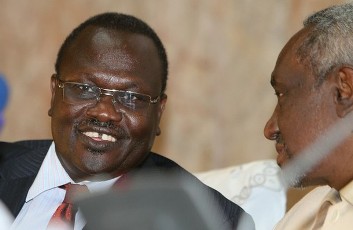S. Sudan’s Machar and Sudan’s Taha hold telephone discussion on current tensions
June 11, 2013 (KHARTOUM/JUBA) – South Sudanese vice-president, Riek Machar and his Sudanese counterpart, Ali Osman Taha agreed, in a telephone conversation, to work together to resolve the current tension between the two countries and renewed their commitment to all the signed agreements.

“The telephone call averted the abrupt oil shut down” said a high ranking official in Juba, who spoke on condition of anonymity. The official was referring to the announcement that president Al-Bashir directed his oil minister, Awad al-Jaz, to shut down the oil pipelines.
South Sudanese official pointed out that Machar, had to call his Sudanese counterpart reminding him of the provision in the cooperation agreements, which demands 60 days’ notice to the other party in case of a decision to suspend any of the issues agreed upon.
The two vice-presidents “agreed to the 60 days within which the process of gradual pipeline closure would take place should there be no positive engagements by the two parties”, the official further stressed.
The two leaders also discussed the need to promote dialogue in resolving any misunderstandings between the two neighbouring countries that share the Africa’s longest borderline of over 2,000km, after South Sudan’s split in July 2011.
In Khartoum, which considers Machar as opposed to any support to rebel groups, an official source confirmed the telephone call, stressing that the two vice presidents reaffirmed their respective countries’ re-commitments to the implementation of the cooperation agreements.
Both leaders, the source told Sudan Tribune, also discussed ways to preserve the interests of the two countries.
The two countries had earlier agreed to form a high level committee to be co-chaired by the two countries’ vice-presidents to discuss claims and accusations over support to rebel groups among others, but have not since met over the matter.
There are also other subordinate committees put in place by the mechanisms, which are yet to be activated.
Sudanese government claim there are some officials in Juba who continue to support rebel groups that are killing its army in Blue Nile, South Kordofan and in Darfur.
However, South Sudan president, Salva Kiir has dismissed allegations that his country supports Sudanese rebel groups.
Observers agree that the lack of trust between the two countries continue to hamper their efforts as they are still differ over other issues like Abyei.
“The step by step approach adopted by the mediation and international facilitators requires a strong commitment and continued dynamic”, a western diplomat told Sudan Tribune.
In Juba, top diplomats from the Troika countries of US, UK and Norway and EU and China have commended the recent high level phone contacts between senior leaders in Sudan and South Sudan and urged the two countries to activate the mechanisms for implementing the September 27, 2012 cooperation agreements.
On Tuesday, ambassadors Susan Page of US, Ian Hughes of UK and Hanne Marrie of Norway, had a lengthy joint meeting with the South Sudan vice president on the current dramatic developments between the two countries following Sudan’s threats of oil shut down.
The Troika diplomats expressed the urgent need to activate high level face-to-face meetings under the mechanisms put in place in the cooperation agreements in order to avoid suspicions and serious unilateral decisions.
The diplomats warned of severe consequences on both countries, should they opt to shut down the main resource that drives the economies of both nations.
In a press statement after the meeting, ambassador Page urged the two parties to promote a high level dialogue and avoid sliding into serious problems.
Meanwhile, the delegation of the European Union led by its special envoy to two Sudans, Dame Rosallind, also held a separate meeting with Machar on Tuesday. The top EU diplomat, also expressed the urgent need to activate the mechanisms for implementing the agreement between Sudan and South Sudan.
The outgoing Chinese ambassador in Juba, Li Zhi Guo, equally expressed concerns about the need to resume high level dialogue between Juba and Khartoum at another meeting with South Sudan vice-president Tuesday.
Machar, however, assured the diplomats that his country was ready for dialogue as well as to activate such mechanisms for implementing the cooperation agreements.
(ST)
